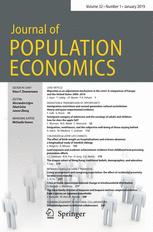The article is testing bequest motives by using a population-wide administrative dataset from Sweden to find that children who likely provided services and daughters with children receive more. However, while adopted stepchildren receive less (Cinderella effect), there is no support for altruism motives.
Read more in:
Oscar Erixson & Henry Ohlsson
Estate division: equal sharing, exchange motives, and Cinderella effects
Journal of Population Economics, Vol. 32 (2019), Issue 4 (October), pp. 1437-1480.
FREE Download PDF
Journal Website, complete issue 4.
Author Abstract: This study contributes to the empirical literature testing bequest motives by using a population-wide administrative dataset, covering data on inherited amounts for complete families matched with an extensive set of economic and demographic variables, to estimate the influence of child characteristics on differences in inherited amounts among siblings. Our main findings are, first, children who are more likely to have provided services to the parent receive more than their siblings, as predicted by the exchange model. Second, daughters with children receive more than sons with children. This is consistent with the prediction of the evolutionary model that larger investments should go to offspring who are certain to be genetically related. There are also Cinderella effects—that is, adopted stepchildren receive less than siblings who are biological or children who are adopted by both parents. Third, we do not find support for the prediction of the altruism model that bequests are compensatory.
Read also the Lead Article of issue 4 (2019):
Gautam Hazarika, Chandan Kumar & Sudipta Sarangi:
“Ancestral ecological endowments and missing women“
Journal of Population Economics, Vol. 32 (2019), Issue 4 (October), pp. 1101-1123
Journal Website, complete issue 4. Paper PDF – OPEN ACCESS.
GLO Fellows Gautam Hazarika, Chandan Kumar Jha & Sudipta Sarangi

Ends;

